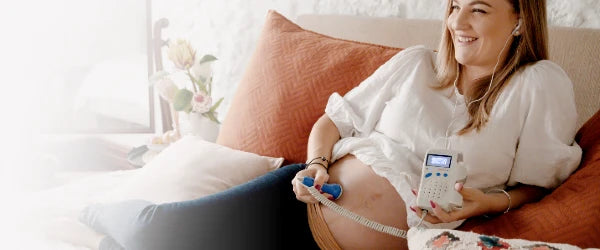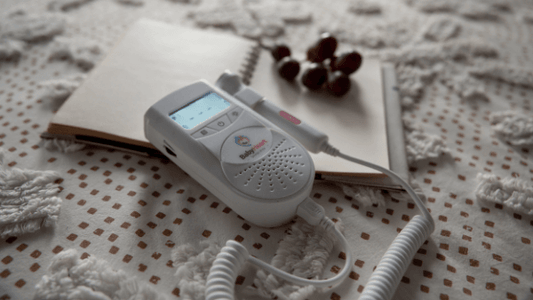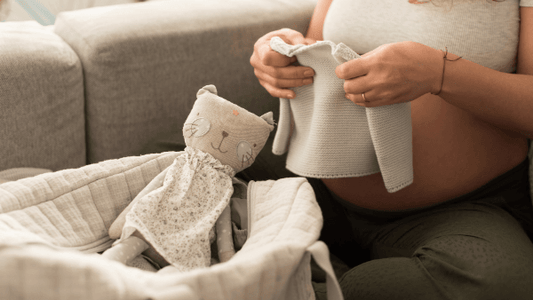
We know that pregnancy can be an amazing and dynamic time! So much is changing and during all the chaos, having a few moments to connect with your unborn baby can bring immense joy and bonding.
This is why fetal dopplers are amazing, and at BabyHeart Australia, we love that we get to be part of the pregnancy journey of so many expectant families and allow them to connect with their little ones.
We know that there are a lot of myths about using fetal dopplers and we want to clarify them for you.
We believe in providing clear and accurate information. So today, let’s discuss some of the myths and truths about fetal dopplers - that way, you can understand if they’re the right choice for you.
Important Disclaimer - BabyHeart dopplers are for sharing special moments and bonding, not for checking your baby's health. They cannot provide peace of mind or reassurance and must not be used for this purpose, as they are not designed for this. Always consult a healthcare professional for any medical concerns.
#1 Myth: Using a Fetal Doppler will make you anxious
Some people may worry that if they are unable to find their baby’s heartbeat at home using a fetal doppler that they will become anxious - and understandably during pregnancy when emotions can run high, becoming anxious is the last thing that any expectant mother would want!
The key is to have reasonable expectations when it comes to using an at-home fetal doppler, and doing a quick bit of reading to know how to use the device before you start.
Truth: Learning how to use a Fetal Doppler correctly will help you enjoy hearing your baby's heartbeat
Once you know how to use a doppler, you’ll know exactly what you’re listening for, and the various factors that can influence whatever the doppler does or does not pick up.
Make sure to read up on doppler FAQs before you get started and you’ll learn the basics - we promise it will make it easier to use!
Important things to keep in mind:
- Be sure to use the device from week 12 onwards; before this, you may have trouble hearing your baby’s heartbeat.
- While you might be able to hear your baby’s heartbeat from as early as nine weeks, most people will hear sounds starting at 12 to 16 weeks of pregnancy.
- The frequency of being able to detect the baby’s heartbeat can vary - some days you might find it easily, other days it might be more difficult. Your pregnancy is a dynamic, ever-changing time and your belly is never the same from day to day.
#2 Myth: Fetal dopplers can be used to diagnose problems at home
Important: They can't be used for this.
Fetal heartbeat dopplers are a fantastic way of connecting with your unborn baby, it’s important to remember that your doppler does not in any way replace your regular checkups with your healthcare professional.
A fetal doppler allows you to hear your baby’s heartbeat at home and share in the joy with friends and family, however, your at-home doppler does not:
- Diagnose irregularities or possible concerns with your pregnancy
- Give an indicator of the baby’s health
- Replace your ultrasounds
- Replace your checkup appointments
- Allow you to skip checkups
- Give an overall indication of your health
- Prevent issues from occurring with your pregnancy
Sometimes, fetal dopplers might potentially pick up on an abnormality - however, this information should only ever be used as a general guide and should always be verified with your healthcare provider. Your healthcare provider will diagnose and treat any issues that occur. Remember, this is not a medical device.
Truth: Fetal dopplers are a great way to connect with your growing baby
Fetal dopplers are ultimately a tool to connect with your unborn child - and when you’re able to gather friends and family around to listen to the baby’s heartbeat from the comfort of your home (and even record the heartbeat and play it back, depending on the model of doppler that you use).
Pregnancy is an amazing time and any opportunity that you can take to feel closer to your little one is an overwhelmingly positive thing.
Fetal dopplers are especially great for expecting families where a partner works away and might feel like they’re missing out on the pregnancy as well as relatives who live far away, but can still feel connected to the new arrival when the heartbeat is saved and sent to them digitally.
And if you’ve got children already, getting them involved in listening to the baby’s heartbeat is a great way to introduce their new sibling.
#3 Myth: Fetal Dopplers aren’t safe to use
Perhaps one of the most common myths about fetal dopplers is that they aren’t safe to use. Some people worry about how ultrasound waves will affect the baby. Some people also feel that repeatedly using a fetal doppler isn’t safe.
However, we know this isn’t the case.
There is also concern that expectant mothers will become overly reliant on using fetal dopplers at home and may use them in place of attending their regular healthcare appointments.
Truth: Using a Fetal Doppler at home is great for bonding and is easy to use (and importantly, does not replace your medical appointments)
Ultrasound as a diagnostic technique has been used since the 50’s without any known adverse impacts.
And in fact, an at-home fetal doppler uses ultrasound waves that are only a fraction of the strength of ultrasound waves that your OBGYN would use in their office (which is still entirely safe!), so they pose virtually no risk to the health of mother or baby.
Research has not indicated any safety risk with ultrasound technology, nor with fetal dopplers.
The quality of a fetal doppler is also important. Every BabyHeart fetal doppler we sell ensures quality.
Handheld fetal dopplers are actually quite easy to use and understand. A fetal doppler is designed for you to listen to your baby’s heartbeat while it is still in the womb for bonding and enjoyment. By using the same technology as ultrasound, a fetal doppler sends high-frequency sound waves into your abdomen. When these sound waves encounter movement, such as your baby’s heartbeat, they send a signal back to the device through the handheld probe. This signal is then translated into a sound and amplified so you can hear it, creating a special bonding experience.
Disclaimer: BabyHeart dopplers are for sharing special moments & bonding, not for checking your baby's health or providing reassurance. Always consult a healthcare professional.

Important reminders about using Fetal Dopplers:
They do not replace scans
Only medical professionals can diagnose, prevent and treat any issues, abnormalities or irregularities that occur during a pregnancy. An at-home fetal doppler should never be used to replace scans or appointments with your healthcare team.
Detecting a clear heartbeat with a fetal doppler does not give a full nor clear indication of your baby’s health, and detecting a heartbeat with your doppler should not be the basis for skipping a checkup or appointment.
They don’t replace you monitoring your own symptoms
Dopplers also don’t replace your own monitoring of your pregnancy symptoms, so be sure to keep a watchful eye on your health and the health of your little one, so you can discuss anything with your doctor. And finally, your health is of the utmost importance during pregnancy - so whether or not you use a doppler, please ensure to schedule regular checkups with your doctor.
* * * * * * *
Need help finding the right Fetal Doppler for your needs? Get in touch with our helpful customer service team today to find the perfect model for bonding with your baby.

 Order today and receive a complimentary, large 250mL Gel valued at $19.99!
Order today and receive a complimentary, large 250mL Gel valued at $19.99!


